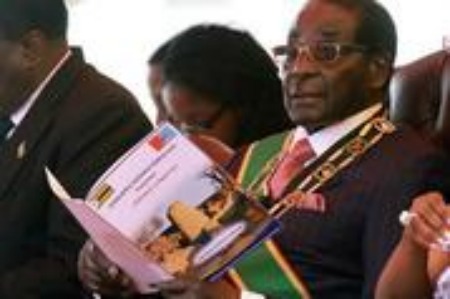 Zimbabwe’s longtime President Robert Mugabe/AP
Zimbabwe’s longtime President Robert Mugabe/AP
HARARE, Zimbabwe — In an election that poses one of the biggest threats to President Robert Mugabe’s 33-year grip on power, Zimbabweans flocked to polling stations Wednesday despite suspicions that vote-counting could be rigged in a nation beset by bitter division and economic hardship.
Bundled against the winter chill, thousands of voters stood patiently in long lines in the poor Harare township of Mbare and other areas. Observers said turnout was high, reflecting the critical stakes of a race that was relatively peaceful in contrast with violent elections in 2008.
Activists believe a big turnout is likely to favor Mugabe’s popular challenger, Prime Minister Morgan Tsvangirai, by blunting the impact of any manipulation of voters’ rolls. Mugabe, who barred Western observer missions, says allegations of vote-rigging amount to mudslinging by opponents.
“Things are going well at this stage of the process,” said Nikita Buturlin, an observer from the Russian Federation. “The numbers are impressive. If there are difficulties, they will come later.”
Some voters were wary, bringing their own pens into the voting booth after hearing rumors that the ink in state-provided pens would disappear after several hours, enabling ballot manipulation.
Ten public buses from South Africa carrying expatriate voters from Tsvangirai’s Movement for Democratic Change party were impounded at the border to Zimbabwe, said party member Gilbert Maganda.
In a telephone interview with The Associated Press, Maganda speculated that police stopped the buses in order to prevent people from voting. His allegation could not be confirmed, but security forces have used similar tactics in past elections.
Mugabe, 89, has said he would step down if he loses. Many Zimbabweans find it hard to believe that the wily politician, who led the country to independence in 1980 and has the backing of the security forces, would relinquish control even if the vote doesn’t go his way.
“So far, so good,” Mugabe said after voting in Harare’s western Highfield township. He said he expected to be re-elected.
“We will have lots of things to do to get our economy back on its feet,” he said.
Tsvangirai, who had been in an uneasy power-sharing arrangement with Mugabe, cast his ballot in northern Harare.
“We have come to complete the change we have always fought for,” he said. “It is an emotional moment for me but I am filled with a sense of calmness.”
The coalition between the two rivals was forged by regional leaders after Zimbabwe’s last disputed election in 2008.
Zimbabwe’s shaky government was effectively dissolved on Wednesday; Mugabe and Tsvangirai have each predicted outright victory that would avoid the formation of another coalition.
Half the population of 12.9 million is eligible to vote. The state election body has said administrative, logistical and funding problems hindered voting arrangements, but said the problems have been fixed at the more than 9,000 polling stations nationwide.
Previous elections in 2002 and 2008 were marred by allegations of vote-rigging and political violence. Rights groups say there has been little overt violence this time but noted deep concerns over shambolic voters’ lists, the role of Mugabe’s loyalist police and military in the voting process and bias in the dominant state media and the sole national broadcaster controlled by Mugabe loyalists.
The International Crisis Group, a research organization, said it fears a return to “a protracted political crisis, and possibly extensive violence” if the Zimbabwe poll is inconclusive and disputed.
Many voters were dressed in heavy coats, scarves and woolen headgear. Some had flasks of hot drinks.
“It is moving slowly, but I am here for as long as it takes. We have got to get this done,” said voter Isaac Rufaro, who joined the line before dawn. Wednesday was a public holiday because of the vote.
In Mbare township, the lines were moving smoothly with ballots being cast at an average of five minutes for each voter in the three votes for president, lawmakers and rural and urban council officials.
The turnout in Mbare in a national referendum on a new constitution in March was “a fraction of what we are seeing today,” said Oskar Wermter, a monitor for the regional Southern Africa Roman Catholic Bishops Conference.
Simbanaouta Muller, a presiding officer at one polling station in Harare, said small numbers of voters were turned away for not having correct voting papers or showing up outside their own districts.
The election is being watched by observers from the regional Southern African Development Community, or SADC, and the continent-wide African Union. Some Western embassies in Zimbabwe have been permitted to deploy a limited number of diplomats to key voting districts.
Voting is scheduled to close at 7 p.m. (1700GMT) but may be extended to a second day Thursday, according to election officials. The electoral commission has promised to release final tallies by Aug. 5.